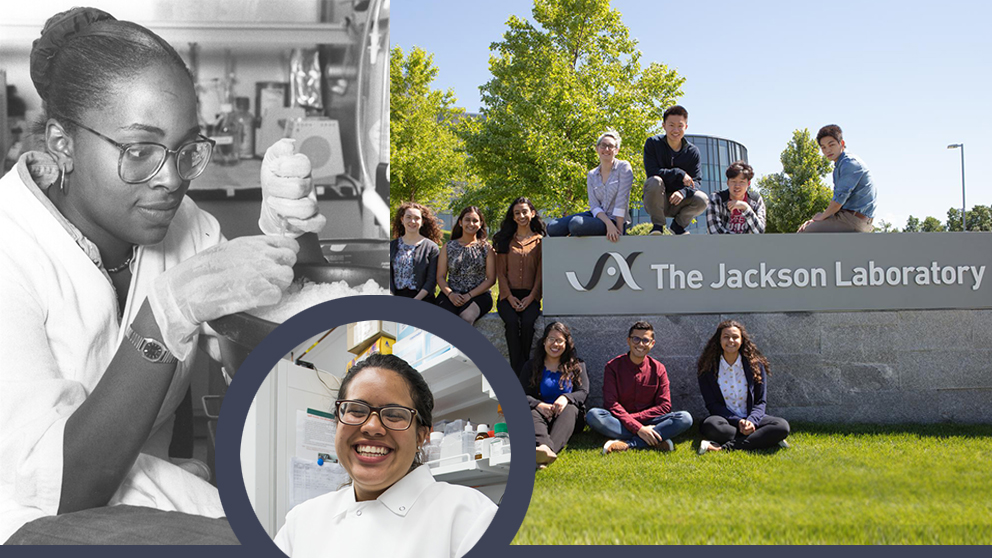The Jackson Laboratory (JAX) is well known for many discoveries in genetics and as a global resource for mouse models of human disease. Still, many may not know that JAX Genomic Education's efforts predate the lab's formal inception.
Let’s take a look back at a brief history of JAX Genomic EducationWhether your focus is on genetics research of expanding the use of genetics in your clinical practice, we welcome you.JAX Genomic Education's mission and a look forward at the exciting programming the future holds.
JAX Genomic Education's origin story begins with Clarence Cook Little, D.Sc., who, as a Harvard student in 1906, began breeding mice with the aim of improving his understanding of genetics and cancer. In 1924 and 1925, Little, then president of the University of Maine, brought undergraduate students and camped on the future JAX campus in Bar Harbor, Maine while leading field studies of the local mammals. Little also gave evening genetics seminars to summer residents, cultivating future donors. However, it wasn't until 1929, after serving as president of the University of Michigan, that Little would formally create a laboratory in Bar Harbor that would become one of the world’s first cancer genetics research institutions.
Teaching has always been in the DNA of JAX. As much as it's a research institution, it's also a place with a mission to educate and inspire current and future scientists through experiential, collaborative and didactic learning.
"Scientists are created in part through the process of experiential education," explains Mike McKernan, former program director for JAX STEM and Undergraduate Education, now director of Government and Community Relations. "Experiential education is by definition, learning by doing. It’s through an aggregate of experiences — learning how to use a research instrument, talking to your mentor about an experiment, standing in front of an audience to give a presentation, learning to analyze data — that JAX prepares future scientists.”
The JAX Summer Student Program
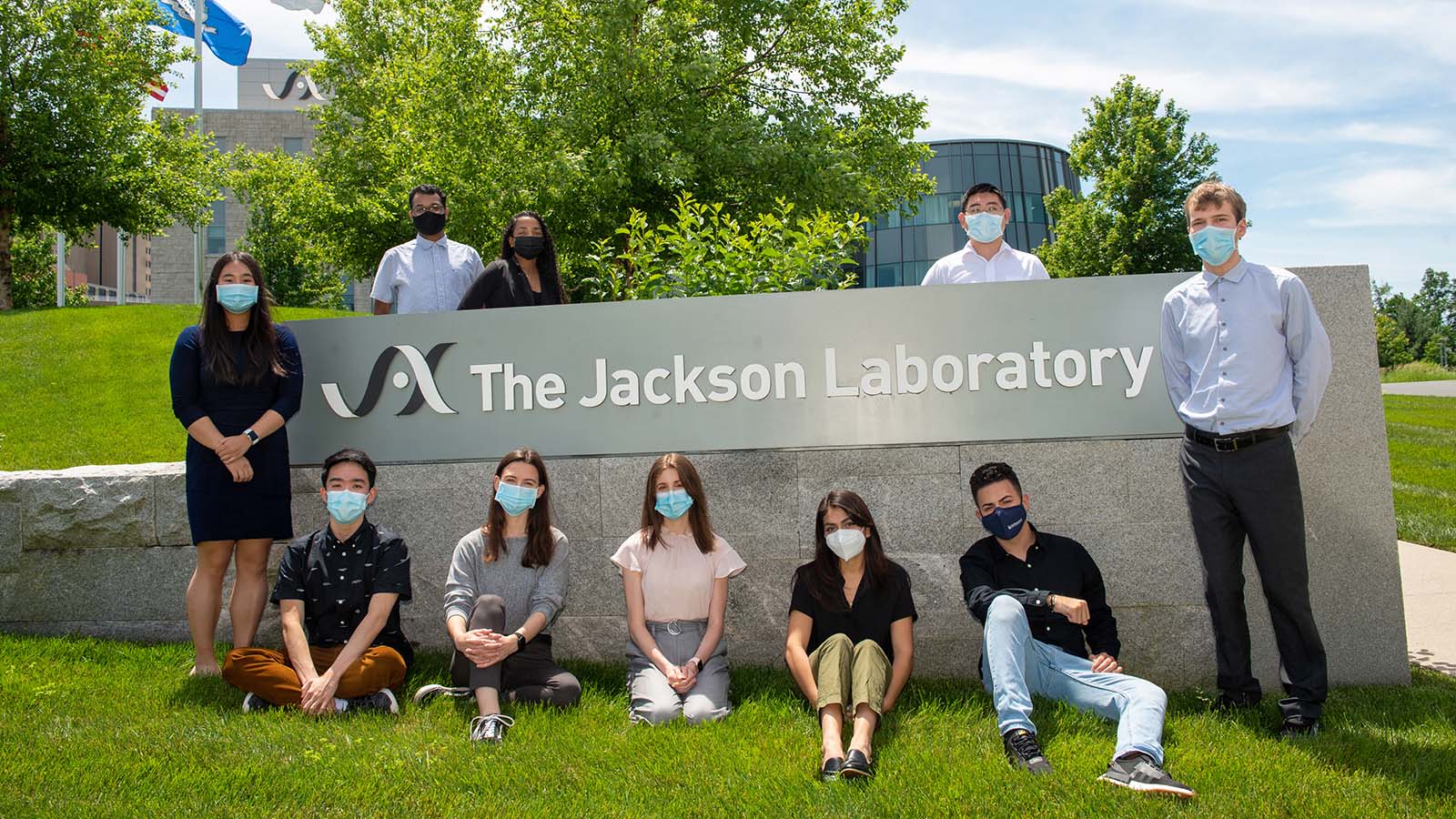 The JAX summer student class of 2021
The JAX summer student class of 2021
While the earliest students camped in the mid 1920s at what would soon become The Jackson Laboratory, the first official JAX students arrived in 1931. These students had the opportunity to initiate research on the causes and potential treatments of cancer.
High School Students, Undergraduates, and TeachersIncluding our flagship Summer Student Program, JAX offers opportunities for academic year research, teacher professional development, and the Maine State Science Fair.Summer student research was active through the 1930s (encountering some lean years through the Great Depression) and finally began to coalesce into something similar to the Summer Student Program of today around 1942. In 1951, JAX received a significant gift in the form of Highseas: the iconic 40-room estate overlooking Frenchman Bay. Another recent milestone with respect to the Summer Student Program was the formation of a second cohort of students at JAX Genomic Medicine, in Farmington, Connecticut.
On either campus, a strong residential program is a defining characteristic for the participants. JAX provides community housing, dining and student services which allow the cohorts of diverse students the opportunity to form community and learn from one another. This immersive experience promotes student research, as each summer student works with a JAX scientist-mentor in an intensive, individualized 10-week program. Students study subjects ranging from science communications to cancer research, and from developmental genetics to computational biology.
While the fields of study have evolved with modern research methods and topics, the philosophy remains the same: instill a more profound knowledge and appreciation of science in the minds of young people while fostering a sense of collaboration amongst their colleagues.
"Several Nobel Prize winners have gone through the program," says Associate Professor Greg Cox, Ph.D., who is also a long-time student mentor. "Participating in the program was a turning point for these and all the students over the years – whether they choose to continue on their science path or not. The summer student program has been an amazing success."
JAX Courses and Workshops
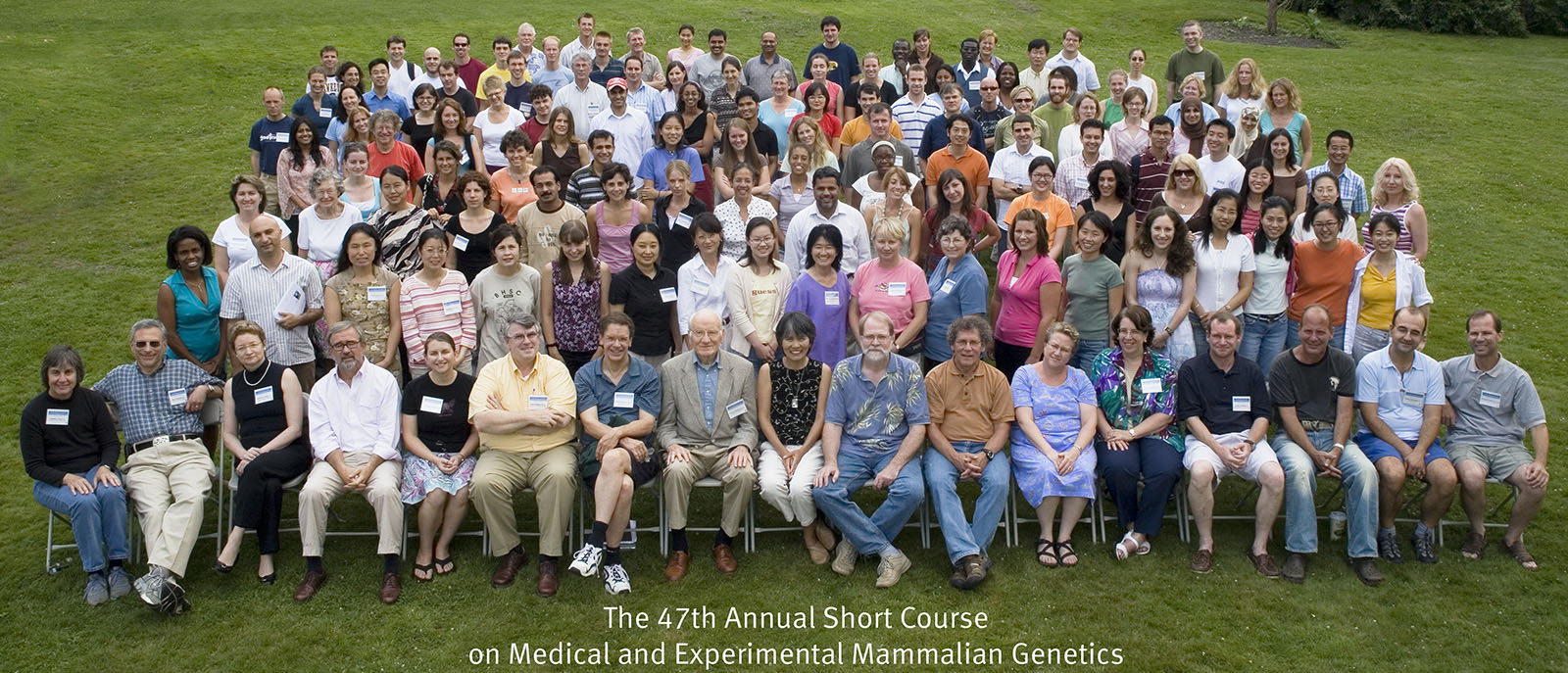 Class Photograph for the 47th Annual Short Course, 2006, the last year Dr. McKusick was able to attend in person
Class Photograph for the 47th Annual Short Course, 2006, the last year Dr. McKusick was able to attend in person
JAX has a long history of running highly-respected educational courses and workshops that attract a wide variety of learners: from undergraduates entering their biomedical careers to established professionals that want to learn a new technique or to advance their learning on a topic of interest. This is the signature of the Human and Mammalian Genetics and Genomics: The McKusick Short CourseThis course includes daily lectures in the mornings and evenings as well as afternoon mini-symposia, workshops, tutorials, demonstrations and a poster session. There is special emphasis on student-faculty interaction. The faculty is diverse in terms of disciplines and the students in terms of stage of career and fields of concentration. This diversity makes for an enriching experience for all. Although the course schedule is quite full, there is time set aside to enjoy the natural beauty of Mt. Desert Island and Acadia National Park.McKusick Short Course in Human and Mammalian Genetics and Genomics (or just Short Course), which was launched in 1959 after a lunch meeting between Victor McKusick, M.D., a Johns Hopkins professor known as "the father of medical genetics" and John Fuller, then director of JAX's education and training program.
It was at that lunch that McKusick, who was born and raised on a Maine dairy farm, proposed a course that was intended to "teach the teachers." In other words, McKusick wanted a way for medical school faculty and research scientists to learn and interact and grow the new field of medical genetics. Just like that the Short Course was created. Many of the aspects from this inaugural Short Course remain to this day: periods of intense learning broken up by networking breaks and free time each afternoon, before keynote-style evening lectures. Dr. McKusick’s course has also stayed current, moving from the biochemistry of DNA to large scale, structural genomics, complex genetic diseases and ELSI (ethical, legal and social implications of genomics).
The effects of the Short Course in the world of genetics have been staggering. More than 7,000 students have attended the course, which has included presentations from more than 630 faculty members from more than 200 different institutions, including 17 Nobel laureates who have presented nearly 70 times. Twenty-eight Short Course students have returned to JAX as faculty members in the course, some for numerous years.
Due to JAX Genomic Education's desire to create cutting edge and interesting programming, there has been substantial evolution in the Short Course over the years. A notable advance occurred in 2004, when a dedicated educational training lab was built at JAX’s Bar Harbor campus that revolutionized biomedical training at the Laboratory. This established a broad selection of intensive, hands-on workshops, exemplified by the National Cancer Institute-funded Cancer Techniques Workshop (offered annually since 2004) which focuses on experiential learning in state-of-the-art technologies for studying a range of common cancers.
A second evolution has been the implementation of hybrid- and virtual-format courses, which were accelerated by the contingencies and safety concerns surrounding the COVID-19 pandemic in 2020. The conversion to this format led to extraordinarily accessible and inclusive participation, with 2020 boasting all-time highs for total participants (2,166 individuals participated in course and workshop offerings) as well as those from minority and/or historically disadvantaged groups. Legacy programs, including the McKusick Short Course, are already pivoting to the hybrid format, while new JAX offerings, including “Growing the Genetics of Addiction Workforce with URM Faculty-Student Research Experiences” and “Impacts of Sleep and Circadian Biology on Alzheimer's Disease and Aging” have this format as their foundation.
JAX Vice President for Education Charlie Wray, Ph.D., says that pivoting to meet new challenges and demands is just what JAX does. "JAX Genomic Education invites and gathers prominent scientists from all over the world,” says Wray. “This allows faculty, students and staff to collaborate and learn together in an informal setting."
Collaborating with experts and a desire to refine professional skills resulted in another new program formed during the 1950s: the postdoctoral training program.
Fellowships and graduate programs
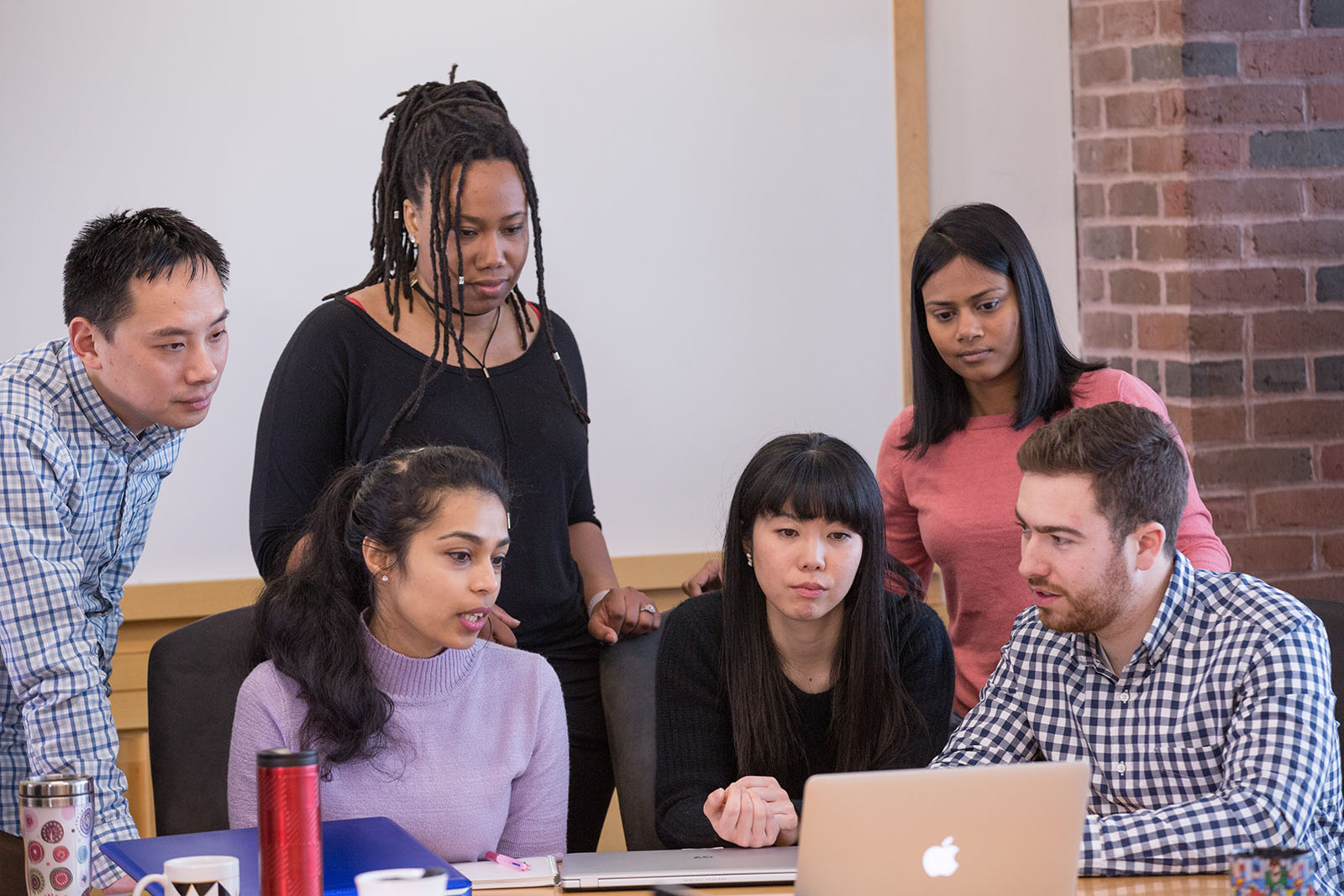 JAX postdocs collaborate and work in this picture from 2017
JAX postdocs collaborate and work in this picture from 2017
While postdoctoral trainees were part of the earliest research teams, JAX officials did not formalize the Postdoctoral AssociatesJAX offers postdocs a unique research environment with access to unparalleled mammalian genetics resources, scientific services, and professional development programs. postdoctoral fellowships until the 1950s.
Establishing this program was vital for the operation of the laboratories at JAX, as the principal investigators (PIs) needed ambitious staff on the team to run and lead experiments. Additionally, JAX could now contribute to the development of emerging scientists.
This exposure to innovative genetic research was highly enriching to the postdoctoral fellows from that era. Since then, exposure to cutting-edge discoveries has inspired and propelled postdocs into pivotal positions in academic and industry research.
"JAX looks for postdocs who are intellectually curious," Meredith Theeman, Ph.D., director of predoctoral and postdoctoral education explains, "PIs take the postdocs’ skill sets and have them apply them in their own way – this supports novel, outside-the-box thinking."
"JAX takes a broad approach to science, not insular and restricting people to one course of study," says JAX Professor Robert Burgess, Ph.D., "JAX encourages the postdocs to branch out – there are no formal barriers. By giving postdocs lots of opportunities, they take something with them: work separate from that of their mentors. This freedom has vast benefits."
"We are specifically creating well-rounded scientists," Theeman says, "These will be the leaders in their field. We help participants with cross-cultural communications, negotiating authorship, managing projects, running teams and writing grants."
This curiosity about genetics and intellectual freedom guided the original postdocs at JAX and still points the way today. JAX has extended its lab training programs to graduate (doctoral) and post-baccalaureate students in more recent years.
Cox explains that the graduate studies program began around 20 years ago with a Functional Genomics program formed with University of Maine. The program was formed with the same "freedom of discovery" principles as those that guide the postdoc program: Students can "shop around" to see which lab is the best fit for them.
"There was a funding initiative through the state of Maine," Cox explains, "They wanted multiple research opportunities for Ph.D. students across Maine. UMaine has some strong biological sciences, but JAX is more highly specialized in mammalian genetics”
As interest grew, JAX launched cooperative programs with other universities looking to offer their doctoral students training in complex genetics and genomics. For example, both University of Connecticut and Tufts University now have graduate program partnerships with JAX.
"Long-term thinking is what's needed to make this work," says Cox, "And I'm pleased to say it's working out very well. Students who were transformed from curious students to successful scientists at JAX are now recommending JAX’s educational programs to more and more students and colleagues."
Building upon the success of these programs, JAX now offers Endometriosis ResearchThe Jackson Laboratory is working on multiple efforts related to endometriosis, including research to discovery causes and therapy targets, to increase understanding and attention for this often misunderstood and understudied condition.postbaccalaureate programs to help students explore careers in biomedical research and to hone specific skills necessary for success in graduate and medical school. The JAX education team designed this program for emerging scientists who have earned undergraduate degrees and want more time at the bench before moving to their next academic level.
High school programming
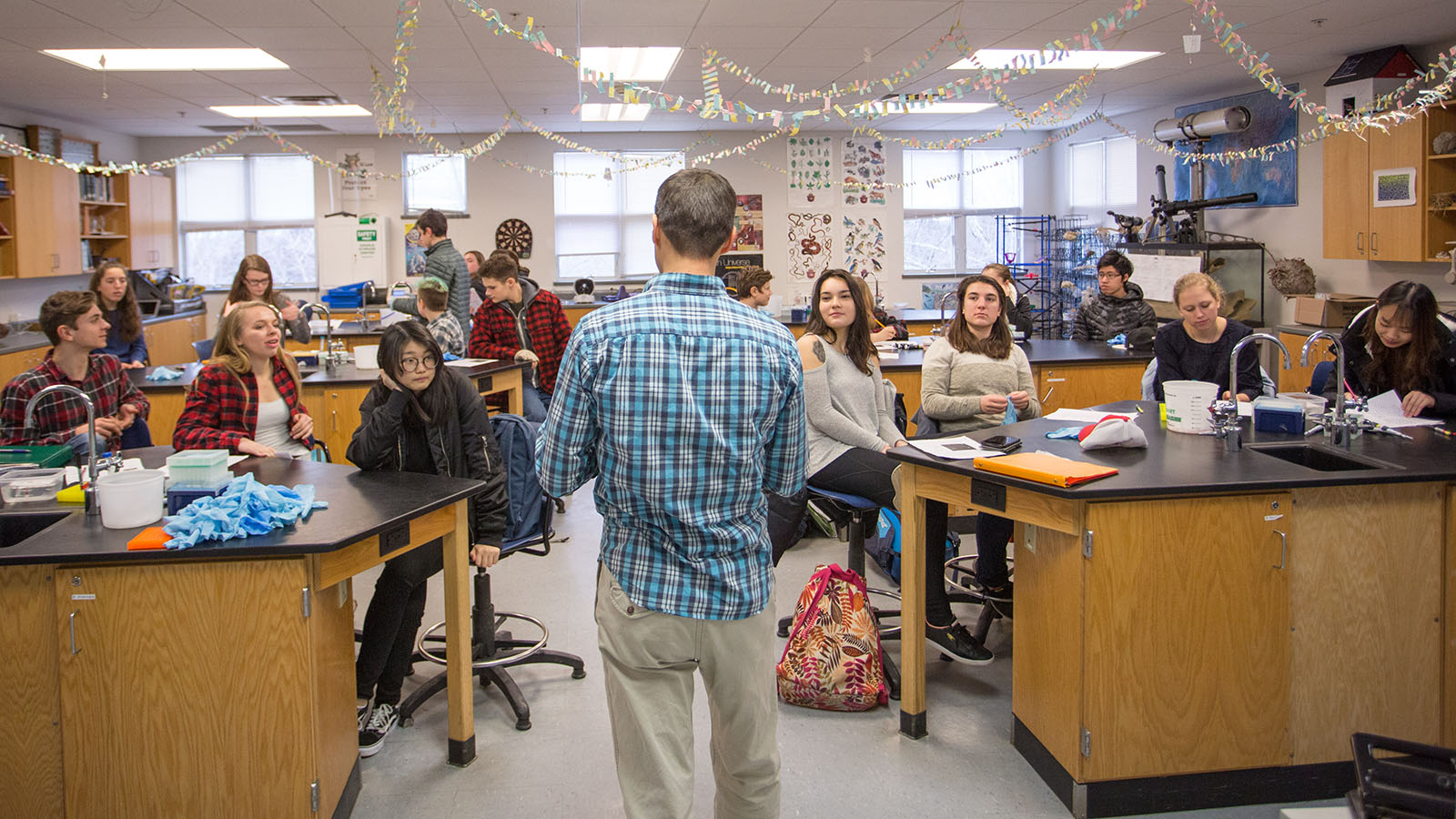 Students at the Lincoln Academy in Maine listen to a presentation of JAX's Teaching the Genome Generation
Students at the Lincoln Academy in Maine listen to a presentation of JAX's Teaching the Genome Generation
JAX Genomic Education has been evolving and expanding in recent years. In 2013 JAX hired a Vice-President of Education and established a fully staffed education department that combines aspects of higher education, research in STEM education and clinical education. Breaking into High School Students, Undergraduates, and TeachersIncluding our flagship Summer Student Program, JAX offers opportunities for academic year research, teacher professional development, and the Maine State Science Fair.high school programming , JAX Genomic Education has focused on the idea of fostering a well-informed, scientifically curious populace, following the Short Course approach of "teaching the teachers.”
This program, called Teaching the Genome GenerationTeaching the Genome Generation™ includes high school teacher professional development and academic year support of innovative lessons in genetics, genomics, and personalized medicine.Teaching the Genome Generation ™, is a signature JAX Genomic Education program, characteristic of the growing organization. The goal of TtGG is to increase and enhance high school genetics and genomics instruction through teacher professional development, a JAX-designed genomics curriculum, and direct support for hands-on molecular genetics in high school classrooms. The hypothesis of TtGG in providing teachers with these tools is that students who complete genetics lessons with a focus on genetic complexity and personal genomics will exhibit more advanced learning outcomes.
"Teaching the Genome Generation™ aims to help students understand the promise and application of genomics in their own lives," Wray explains. "The strategy is to recruit and partner with teachers who will teach human genomics year after year in their high school classes. JAX is thrilled to provide on-going training and resources so teachers and students have access to current lessons in genomics, bioinformatics and bioethics."
TtGG is offered at no cost to the learner and takes many forms, from teacher training sessions to online lesson plans and more. Professional development is provided both in-person and online.
Clinicial education programs
In Fall 2013 JAX Genomic Education, recognizing the need to expand the genomic literacy of the current clinical workforce to realize the translation of research from the bench to the bedside, established the Clinical Education ResourcesResources for clinical educators teaching genetics.Clinical Education Program . To date, the majority of CEP’s work has focused on outreach and collaboration with health systems, public health providers, professional societies, and training programs to develop and deliver educational programs directly to clinicians, primarily those without formal training in genetics. A focus for CEP has been areas of genomics that have immediate clinical relevance.
“Clinicians have to deal with many competing priorities, only one of which is the impact of genomics on health,” Director of CEP Kate Reed explains. “Our goal is to create educational opportunities that are widely accessible, clinically relevant and targeted to allow clinicians to build the skills they need to incorporate genomic thinking into patient care.”
As one example, education has been a central component of The Maine Cancer Genomics Initiative, a program conceptualized and run by JAX to facilitate access to genomic testing and targeted treatment to cancer patients in Maine. CEP develops educational resources for oncology providers to support their understanding and use of results from genomic tumor testing in patient care. The evidence base associating specific genomic variants with genomically informed treatments is rapidly evolving, and care providers find it challenging to stay current. This is especially true for clinicians practicing in community settings without access to the resources of academic medical centers, as is the case in Maine and other rural states. The education that CEP develops, along with the genomic tumor boards run by MCGI, are provided at no cost to Maine clinicians. These resources are provided online to allow for greatest access.
Online and Digital Education
As discussed above, JAX Genomic Education focuses on forward thinking educational programs and experiences. Often these are in person, such as a course or workshop. While these experiences are enriching for the attendees, they are size limited. In light of this, JAX Genomic Education has combined modularity, technology and modern learning management systems to reach a much wider audience through the JAX Online MicroLessons and MiniCoursesSelf-paced online learning from the genetics and genomics experts at The Jackson Laboratory, designed for graduate and postdoctoral students, research assistants, early career scientists, lab technicians and advanced undergraduates with a background in biology.Online and Digital Education Program .
Established in Spring 2015, Online and Digital Education brings the power of online learning to bear with JAX’s tradition of education programming, scientific services and faculty research, with the objective of making the JAX Genomic Education ecosystem flexible and visible to as many people around the world as possible.
The response so far has been positive and encouraging, with attendance numbers exceeding expectations – over 50,000 online enrollments and growing. The online offerings range from short, self-guided online MicroLessons to deeper immersion MiniCourses covering topics related to genetics and genomics.
"We are enjoying success with online education and meeting our goals with respect to raising the visibility of JAX’s research," Director of Education Platforms Bill Barter comments. "No matter where someone lives, they can learn about genetics and genomics in a way that meets their individual needs.”
The continuing mission of education
 An aerial photo of the JAX campus in Bar Harbor, Maine, taken in 2011
An aerial photo of the JAX campus in Bar Harbor, Maine, taken in 2011
JAX Genomic Education continues to expand, following four guiding principles: focusing on the next generation of biomedical leaders; embracing diversity, equity and inclusion in all educational programs; use of evidence-based best practices in education; and reaching the most participants as possible with cutting-edge genetics and genomics knowledge.
One part of this is lateral thinking, or pushing outside of one's primary area of comfort and expertise. "Specialization is good," says Burgess, "but there may be a limited impact to that. Being able to apply research to multiple study areas is what makes breakthroughs, and that's the way JAX works: encouraging branching out."
JAX education is committed to offering high-quality online content while still retaining signature in-person experiential learning to facilitate this idea of branching out. "Online education is essential to JAX," says Wray, "It complements and supplements, but does not replace, the in-session, hands-on experiential learning at JAX. The science of genetics and genomics will continue to expand, and we’ll continue to provide educational resources and experiences in an equally expansive way."
Theeman echoes this sentiment, saying, "We will enhance in-person programs and maintain virtual access – welcoming participants from across the globe. We want to make people aware of JAX educational programming on an international level."
This idea of diversity and access to information will be a primary motivation moving ahead as well. "We want to capture young scientists who are just considering research careers," Theeman says, "We are focusing on the diversity of life experiences; we are aware that heterogenous groups more often spawn innovative thinking."
"Education brought scientists from all over the world to Bar Harbor in the pre-internet days," says Wray. "It allowed science people to come in, collaborate and work – sharing ideas and co-developing concepts." He then went on to say that these ideals persist and are being enhanced and remodeled for best practice of sharing over a digital medium. JAX educators want more people to take advantage of its scientific excellence, advanced learning and history.
"There are so many opportunities," says Cox, "with mouse models of human diseases, the Knockout Mouse Project, phenotyping, mutagenesis, computational sciences, etc. There are resources at JAX, all under one roof, that you can't get anywhere else."
As time goes on, JAX Genomic Education will continue to work hard to provide advanced, interesting and useful programming to the world. If you would like to learn more about JAX Genomic Education’s current slate of programming, JAX Genomic EducationWhether your focus is on genetics research of expanding the use of genetics in your clinical practice, we welcome you.read more here .
